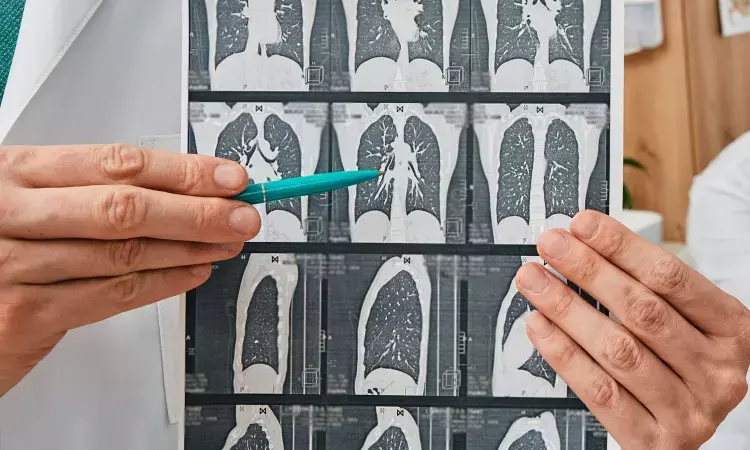- Home
- Medical news & Guidelines
- Anesthesiology
- Cardiology and CTVS
- Critical Care
- Dentistry
- Dermatology
- Diabetes and Endocrinology
- ENT
- Gastroenterology
- Medicine
- Nephrology
- Neurology
- Obstretics-Gynaecology
- Oncology
- Ophthalmology
- Orthopaedics
- Pediatrics-Neonatology
- Psychiatry
- Pulmonology
- Radiology
- Surgery
- Urology
- Laboratory Medicine
- Diet
- Nursing
- Paramedical
- Physiotherapy
- Health news
- Fact Check
- Bone Health Fact Check
- Brain Health Fact Check
- Cancer Related Fact Check
- Child Care Fact Check
- Dental and oral health fact check
- Diabetes and metabolic health fact check
- Diet and Nutrition Fact Check
- Eye and ENT Care Fact Check
- Fitness fact check
- Gut health fact check
- Heart health fact check
- Kidney health fact check
- Medical education fact check
- Men's health fact check
- Respiratory fact check
- Skin and hair care fact check
- Vaccine and Immunization fact check
- Women's health fact check
- AYUSH
- State News
- Andaman and Nicobar Islands
- Andhra Pradesh
- Arunachal Pradesh
- Assam
- Bihar
- Chandigarh
- Chattisgarh
- Dadra and Nagar Haveli
- Daman and Diu
- Delhi
- Goa
- Gujarat
- Haryana
- Himachal Pradesh
- Jammu & Kashmir
- Jharkhand
- Karnataka
- Kerala
- Ladakh
- Lakshadweep
- Madhya Pradesh
- Maharashtra
- Manipur
- Meghalaya
- Mizoram
- Nagaland
- Odisha
- Puducherry
- Punjab
- Rajasthan
- Sikkim
- Tamil Nadu
- Telangana
- Tripura
- Uttar Pradesh
- Uttrakhand
- West Bengal
- Medical Education
- Industry
CHEST releases Guideline on handling endobronchial ultrasound transbronchial needle samples

The American College of Chest Physicians (CHEST) recently released a new clinical guideline on endobronchial ultrasound-guided transbronchial needle aspiration (EBUS-TBNA) specimen processing and handling. Published in the journal CHEST, the guideline contains nine evidence-based recommendations to identify best practices for collection, processing, and handling of EBUS-TBNA specimens.
“Endobronchial ultrasound-guided transbronchial needle aspiration has become the standard for initial lung cancer diagnosis and staging, but there is little guidance available on handling and processing specimens during and after acquisition to help optimize both diagnostic yield and specimen preservation for downstream ancillary testing,” says Christopher Gilbert, DO, MS, FCCP, lead author on the guideline. “In [the panel’s] experience, sample collection varies widely between institutions. This guideline seeks to leverage learned experiences of both pulmonologists and pathologists to standardize the process.”
Evidence of the handling and processing of EBUS-TBNA specimens varies in strength but is satisfactory in some areas to guide clinicians in certain aspects of specimen handling. The guideline authors conclude that additional research in many aspects of specimen handling and processing is needed to help improve the knowledge base.
The recommendations of the guideline include:
- In patients with suspected malignant disease undergoing EBUS-TBNA, we recommend performing four or more needle passes over three or less needle passes. (Strong Recommendation)
- In patients with suspected malignant disease undergoing EBUS-TBNA, we suggest utilizing rapid on-site evaluation over usual care. (Conditional Recommendation)
- In patients with suspected malignant disease undergoing EBUS-TBNA, we suggest using a smaller needle (21 gauge or 22 gauge) over a larger needle (19 gauge). (Conditional Recommendation)
The entire list of recommendations included in the new guideline can be accessed through the CHEST journal website.
Reference:
Gilbert, Christopher R. et al.,Acquisition and Handling of Endobronchial Ultrasound Transbronchial Needle Samples – An American College of Chest Physicians Clinical Practice Guideline, CHEST Journal, DOI:10.1016/j.chest.2024.08.056.
Dr Kamal Kant Kohli-MBBS, DTCD- a chest specialist with more than 30 years of practice and a flair for writing clinical articles, Dr Kamal Kant Kohli joined Medical Dialogues as a Chief Editor of Medical News. Besides writing articles, as an editor, he proofreads and verifies all the medical content published on Medical Dialogues including those coming from journals, studies,medical conferences,guidelines etc. Email: drkohli@medicaldialogues.in. Contact no. 011-43720751


